
If you overindulged during the holiday season and are tempted to “detox” or “cleanse” yourself with one of the popular regimens, we have some advice: Don’t. Most of these so-called programs—the liquid diet, the elimination diet, the juice cleanse, fasting, restricting, whatever—not only won’t help you, they may dehydrate you and cause other harm. “The main issue with detoxes is they promise a reset but just trade one series of bad behaviors for another,” says Meghan McLarney, RD, a certified diabetes educator and nutrition therapist with the University of Nebraska Medical Center and Nebraska Medicine in Omaha. Then you have to detox from the detox. Instead of a potentially unhealthy quick fix to start your new year, try smaller, sustainable, simple changes. (Thinking about a detox? Read this first.)
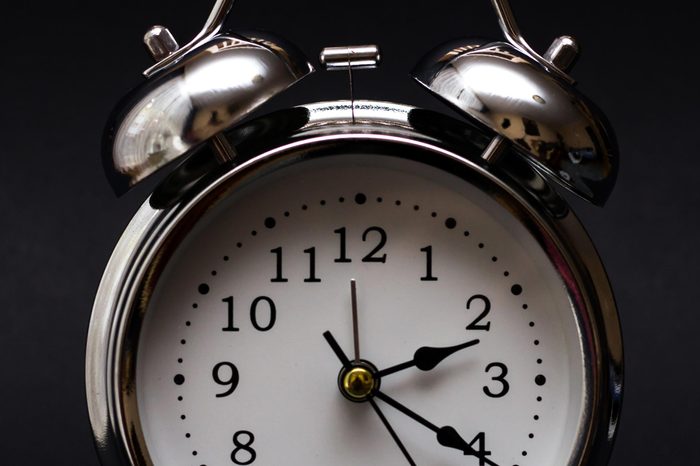
Reset your sleep schedule
If you ate, drank and were generally merry over the holidays, chances are you also skimped on sleep. This is a good place to start rebooting, says Steven Wengel, MD, assistant vice chancellor of campus wellness for the University of Nebraska Medical Center and the University of Nebraska at Omaha. “You get out of your rhythm over the holidays,” he says. “It’s okay to get out of your normal routine a little bit but if you stay out for weeks at a time, it’s hard to get back into it.” Sleep deprivation can also put your satiety hormones out of whack, making you more likely to overeat, and elevate cortisol, making you more anxious. The National Sleep Foundation recommends that adults get seven to nine hours of sleep each night. A third of Americans aren’t getting what they need, according to the Centers for Disease Control and Prevention. And that’s not even at the holidays.
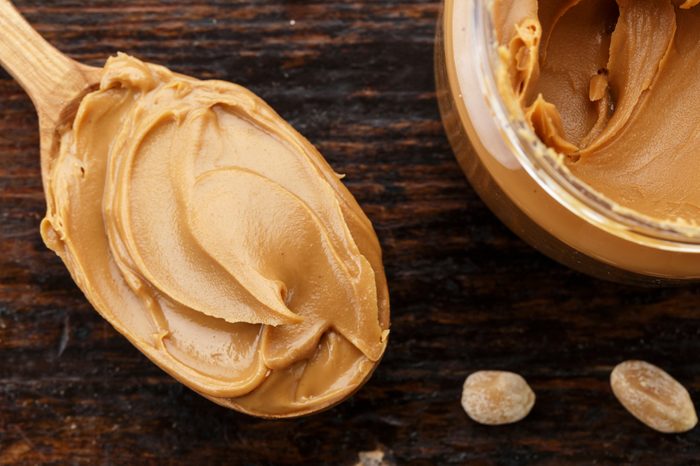
Eat breakfast
“Research shows that people who eat a good breakfast eat less calories throughout the day,” says McLarney. “It will curb your appetite.” What’s a “good” breakfast? Anything of nutrient value that you eat or drink, she says. It doesn’t have to be an omelette. The trick is to have two food groups, protein being one of them. Vegetable juice or fruit and a piece of cheese are good options, as is peanut butter on whole-wheat toast. And, yes, you can eat it in the car or on the go, just make sure it’s within an hour of waking up, says McLarney. Eating breakfast also helps control your blood sugar throughout the day and may improve cognitive performance. Here are some high-protein breakfast ideas to get you going.
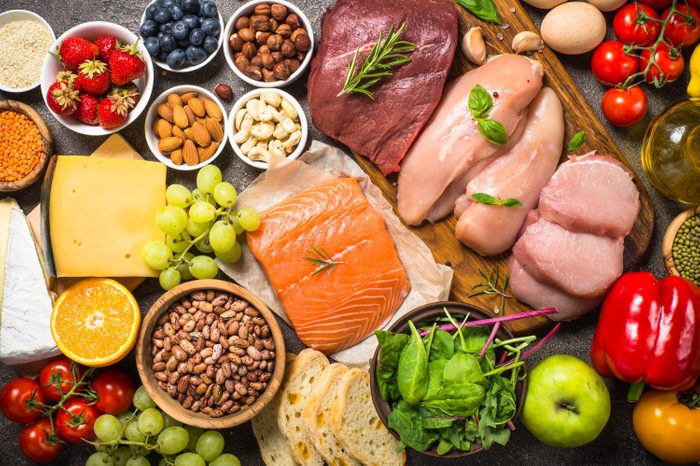
Take a whole-foods approach
That means getting your nutrients from actual food sources, says Yasi Ansari, RD, Los Angeles-based national media spokesperson for the Academy of Nutrition and Dietetics. Specifically, eat at least the recommended five servings of fruits and veggies daily, boost overall fiber, get at least three to four ounces of lean protein through animal or plant sources at each meal, decrease added sugar and saturated fat and increase foods (like beets, cruciferous veggies, lemon and avocados) that help support the liver. Fermented food products, like yogurt, kimchi and miso can help support gut health. “There is a way to commit to healthy eating, without spending a bunch of money on a cleanse and instead using a food only approach as a way to reboot for the new year,” says Ansari. (Here are 30 ways to get more fiber in your diet without really trying.)

Practice mindfulness
You can be mindful just going about your day — driving, working, washing the dishes, eating. But a regular meditation practice can help you start your year in a powerfully quiet way. If you’re not sure how or where to start, take note from a 2019 study in Behavioural Brain Research. Scientists found that people who did 13 minutes of a daily guided meditation session for eight weeks (four weeks wasn’t long enough, they determined) experienced better mood, attention and memory as well as less anxiety. This was compared to a similar group of people who listened to a 13-minute podcast each day. If even 13 minutes seems too much, try five or 10. “It’s more staying in a pattern,” says Dr. Wengel.
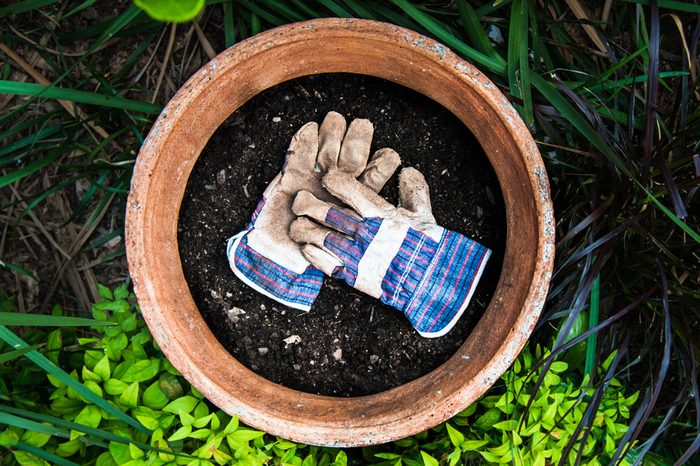
Try to move more (no need to call it “exercise”)
“Folks get intimidated when I say exercise,” says Margaret Mangan, a registered dietitian at the University of North Carolina REX Nutrition Services Raleigh and Diabetic Education Center in Raleigh. Yes, national guidelines recommend at least 150 minutes of moderate intensity exercise or 75 minutes of vigorous aerobic activity each week. But it doesn’t have to be all at once and it doesn’t have to be at the gym. “Don’t feel like you have to put on some tight skimpy workout clothes,” says Mangan. Or drop a bundle on a gym membership. Throw a dance party, or spend some time working in the garden instead.

Moderate alcohol
Alcohol is part of the holidays for many people. Hopefully you didn’t overdo it but if you did (no judgment here), it’s time to reevaluate. “Avoid heavy drinking as this affects sleep, hormones, recovery and overall health,” says Ansari. “Alcohol also doesn’t help support a healthy liver—which won’t help during a ‘detox’ period.” The latest Dietary Guidelines recommend limiting yourself to one drink a day if you’re a woman and two a day if you’re a man, and only if you’re legal age. When you do drink, you can blunt the aftereffects by alternating each alcoholic beverage with a glass of water, says Ansari. Also drink plenty of water before you go to bed and start the next day with one of those healthy breakfasts, adds McLarney. (Here are 17 tips for cutting back on alcohol.)
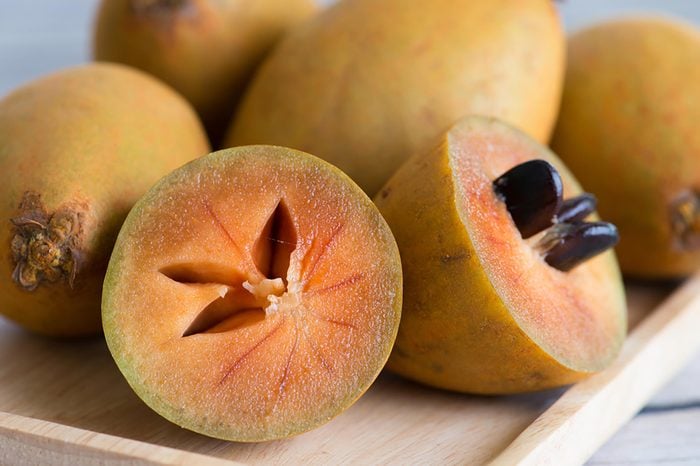
Think of it as more, not less
We can easily get into a mentality of giving things up, says McLarney. Instead, think of your New Year “detox” as “enriching your life with better nutrition,” she suggests. Try adding a new fruit (ever heard of a sapodilla?) each week. Citrus fruits come into season in the winter, apples and pears are available through February while berries and asparagus come out in the early spring months. “If you pursue eating with a sense of adventure and make it a reward, that can be great,” McLarney says. And don’t beat yourself up for indulging in foods you love over the holidays, says Ansari. “Simply find ways to add more healthy favorites rather than focusing on what not to eat,” she adds. Here are some exotic fruits to experiment with this year.

Maintain social connections
Just because the holidays and their relentless social opportunities have passed, don’t be a hermit. It’s really important to maintain social connections, even (especially) if you don’t keep up a frantic pace. Relationships can help us live longer, healthier lives, according to a study in the Annual Review of Psychology. But just do what’s comfortable. “Social connectedness, again it’s what’s sustainable, it’s not over the top, something you regularly have lunch with a friend or checking on a neighbor who needs help or giving back for people who are lonely,” says Dr. Wengel. And here are 50 tricks on how not to feel lonely yourself.

Clean house
Specifically your food environment, which may be littered with holiday cookies, remains of ginger bread houses, and egg nog. “Take a good look around your home and take those things that are not nutritious, healthy, foods that aren’t part of a meal and that would tempt a person out of the house,” says McLarney. You can also put leftovers in individual containers in the freezer and feast on one a week. Or use them to maintain positive social interaction. “There are people who would love to have them, lonely neighbors up the street who don’t have a cookie tray,” says McLarney.
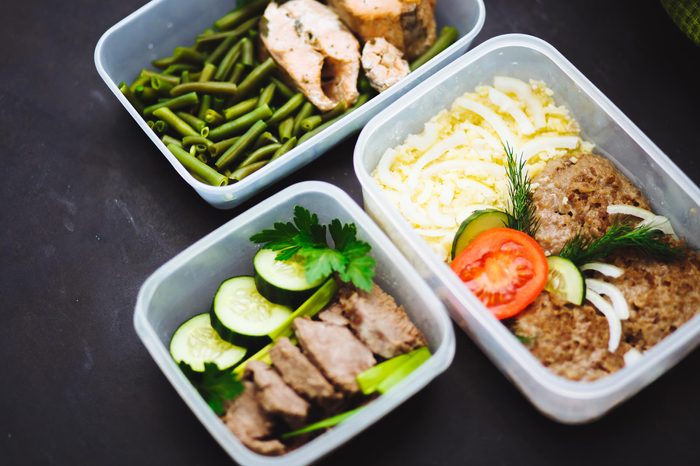
Plan your meals
Or at least some of your meals. A 2017 study in the International Journal of Behavioral Nutrition and Physical Activity found that people who planned meals “at least occasionally” were less likely to be obese. They also had more variety in their diets and were more likely to stick to nutritional guidelines. Although the researchers couldn’t prove that meal planning was actually responsible for any of these outcomes, it makes sense. At the very least, planning meals probably cuts down on impulsive eating. “Plan meals that are easy to plan,” McLarney suggests. “Stock up your refrigerator with Greek yogurts and fruits that don’t spoil easily.” If you have the budget, look into some of the meal prep services. Here are eight free meal planners.
